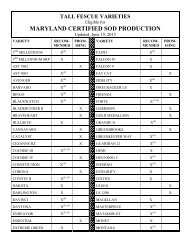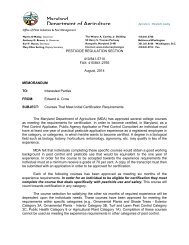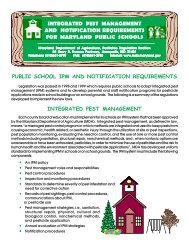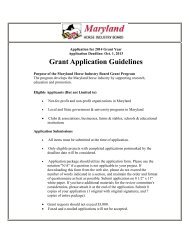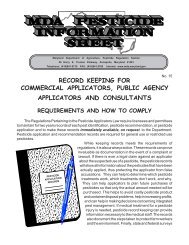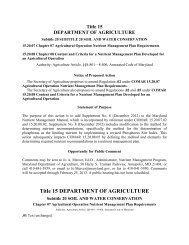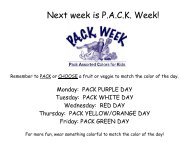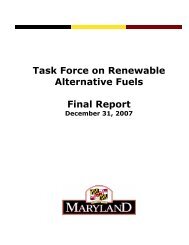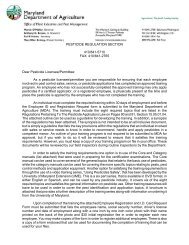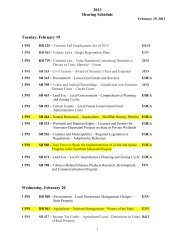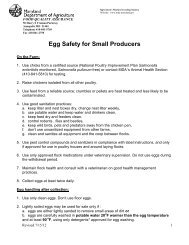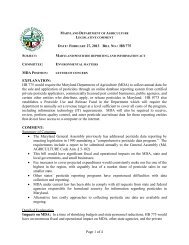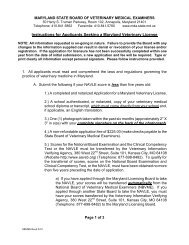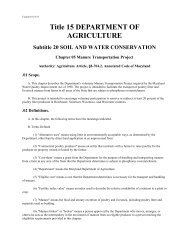Garden Planner and Checklist - Maryland Department of Agriculture
Garden Planner and Checklist - Maryland Department of Agriculture
Garden Planner and Checklist - Maryland Department of Agriculture
You also want an ePaper? Increase the reach of your titles
YUMPU automatically turns print PDFs into web optimized ePapers that Google loves.
Take it from Maryl<strong>and</strong> Farmers<br />
<strong>Garden</strong> <strong>Planner</strong><br />
<strong>and</strong> <strong>Checklist</strong><br />
Take it from Maryl<strong>and</strong> farmers, winter is a good time to plan for springtime planting. Beautiful, healthy gardens<br />
don’t just happen—they are planned, <strong>and</strong> winter is the best time to sit down <strong>and</strong> think about what types <strong>of</strong><br />
projects or enhancements you want to tackle this year. The following checklist can provide you with some food<br />
for thought during the long, cold winter months.<br />
These gardening tips<br />
are brought to you by<br />
the Maryl<strong>and</strong><br />
<strong>Department</strong> <strong>of</strong><br />
<strong>Agriculture</strong> <strong>and</strong> the<br />
Home <strong>and</strong> <strong>Garden</strong><br />
Information Center, a<br />
service <strong>of</strong> the<br />
University <strong>of</strong><br />
<br />
Nuts <strong>and</strong> Bolts:<br />
Fall Equipment <strong>and</strong><br />
Maintenance Chores<br />
Backyard Actions for a Cleaner Chesapeake Bay...<br />
Office <strong>of</strong> Resource Conservation 50<br />
Harry S. Truman Parkway<br />
Annapolis, MD 21401<br />
410-841-5863 | mda.maryl<strong>and</strong>.gov<br />
Financial assistance provided by the Coastal<br />
Zone Management Act <strong>of</strong> 1972, as amended,<br />
administered by the Office <strong>of</strong> Ocean <strong>and</strong><br />
Coastal Resource Management, National<br />
Oceanic <strong>and</strong> Atmospheric Administration<br />
(NOAA).<br />
University <strong>of</strong> Maryl<strong>and</strong> Extension<br />
Home <strong>and</strong> <strong>Garden</strong><br />
Information Center<br />
12005 Homewood Road<br />
Ellicott City, MD 21042<br />
extension.umd.edu/hgic<br />
Maryl<strong>and</strong> Extension.<br />
For answers to all<br />
your gardening <strong>and</strong><br />
pest control<br />
questions, vist the<br />
Center's website at<br />
extension.umd.edu/<br />
hgic.<br />
l Sharpen lawnmower blades, grass<br />
clippers, pruning shears <strong>and</strong> loppers.<br />
l Service garden equipment such as<br />
mowers, edgers <strong>and</strong> tillers.<br />
l Clean out the garden shed.<br />
l Repair or replace worn tools.<br />
l Clean <strong>and</strong> s<strong>and</strong> rust <strong>of</strong>f <strong>of</strong> garden<br />
tools. Sharpen edge tools <strong>and</strong> rub<br />
linseed oil into wooden h<strong>and</strong>les.<br />
l Drain <strong>and</strong> store all garden hoses.<br />
l Turn <strong>of</strong>f water to outdoor spigots<br />
<strong>and</strong> drain check valves.<br />
l Prune dead <strong>and</strong> diseased<br />
branches from deciduous trees<br />
<strong>and</strong> shrubs. Snow <strong>and</strong> ice can<br />
cause these branches to come<br />
down unexpectedly.<br />
l Incorporate organic matter into the<br />
soil in September or October. This<br />
may also help disrupt the life-cycle<br />
<strong>of</strong> over-wintering insect pests.<br />
l Mulch tender perennials with<br />
straw or shredded leaves to protect<br />
their crowns.<br />
MDA 15.14.10
Plan Your <strong>Garden</strong>:<br />
Early Winter Chores<br />
l Order seed catalogs<br />
from companies<br />
that you wish to<br />
patronize.<br />
l Research<br />
native plants<br />
that require<br />
little or no care <strong>and</strong><br />
provide habitat <strong>and</strong> food<br />
for wildlife.<br />
Practice Backyard<br />
Conservation<br />
l Take a soil sample or request one from your lawn<br />
care company before fertilizing. A soil test will help<br />
you determine the right amount <strong>of</strong> fertilizer or lime<br />
to apply for a healthy lawn <strong>and</strong> a healthy Chesapeake<br />
Bay. Visit www.hgic.umd.edu for a list <strong>of</strong> soil testing<br />
labs <strong>and</strong> to learn how to take a sample.<br />
l Research rain barrels to help save on water bills <strong>and</strong><br />
protect plants during periods <strong>of</strong> drought.<br />
l Scope out a spot in the yard to start a compost pile.<br />
l Plan a rain garden for a low spot in your yard that will<br />
allow stormwater to infiltrate slowly into the ground<br />
rather than running <strong>of</strong>f into the nearest storm drain.<br />
l Do not broadcast fresh manure or fertilizer <strong>of</strong> any<br />
kind on frozen ground.<br />
l Lime may be applied during the winter months<br />
according to soil test recommendations.<br />
l Cut spent chrysanthemum plants to the ground.<br />
Prune out <strong>and</strong> compost the dead stalks <strong>and</strong> leaves<br />
<strong>of</strong> peonies, hollyhocks <strong>and</strong> other perennials.<br />
l Check the guy wires on newly planted trees to make<br />
certain that they are not gouging the bark.<br />
l Keep compost bins covered to prevent over saturation<br />
<strong>and</strong> leaching <strong>of</strong> nutrients from the compost.<br />
<br />
When it<br />
Warms Up<br />
l Turn outdoor compost piles when the weather<br />
begins to warm. Remove woody stems <strong>and</strong> twigs<br />
that take a long time to compost. Shred leaves<br />
that have been stockpiled over the winter before<br />
adding them to compost bins.<br />
l Fruit trees should be pruned in late winter, right<br />
before bud break. Do not prune on mild winter days,<br />
as this may stimulate growth <strong>and</strong> cause a premature<br />
loss <strong>of</strong> dormancy.<br />
l Remove dead <strong>and</strong> diseased wood <strong>and</strong> weak stems<br />
from other trees <strong>and</strong> shrubs that have been damaged<br />
over the winter.<br />
l Cut down last year’s growth <strong>of</strong> ornamental grasses<br />
to within a few inches <strong>of</strong> the ground. This will help<br />
to make room for new growth.<br />
l Use the “bounce test” to determine if your soil is dry<br />
enough to work. Squeeze a clump <strong>of</strong> soil into a ball<br />
<strong>and</strong> bounce it up <strong>and</strong> down in your h<strong>and</strong>. If it easily<br />
breaks apart, you’re ready to go.<br />
l Sow lettuce, spinach, radishes <strong>and</strong> other fast-growing<br />
salad greens in fertile soil. Keep young plants wellwatered<br />
<strong>and</strong> fertilize with a balanced liquid fertilizer.<br />
l Overseed lawns at the rate <strong>of</strong> three to four pounds <strong>of</strong><br />
tall fescue seed per 1,000 square feet. Apply a starter<br />
fertilizer <strong>and</strong> water seeded areas thoroughly twice a<br />
day to promote strong, early growth.<br />
l Apply a crabgrass pre-emergent herbicide if you had<br />
a serious crabgrass problem last year <strong>and</strong> are not<br />
planning to re-seed this spring.<br />
l Work rotted manure or compost into vegetable <strong>and</strong><br />
flower beds. Never add fresh manure to vegetable<br />
beds in the spring.<br />
l Review last year’s garden diary to<br />
see what worked <strong>and</strong> what did not.<br />
Now is the time to look back <strong>and</strong> jot<br />
down observations so that you can build<br />
on your successes for next year.<br />
l Place orders for seeds <strong>and</strong> bulbs with<br />
gardening catalogs.<br />
l Research different types <strong>of</strong> compost bins or<br />
learn how to make your own.<br />
l Check out the dates for upcoming Master<br />
<strong>Garden</strong>er classes at your local Extension <strong>of</strong>fice.<br />
Visit www.mastergardener.umd.edu.<br />
<br />
Odds<br />
<strong>and</strong><br />
Ends<br />
l Be a good neighbor <strong>and</strong> protect the Bay—pick up<br />
after your pet. When walking your dog, bring along<br />
a plastic bag <strong>and</strong> scooper. Pet waste should also be<br />
removed daily from yards <strong>and</strong> exercise areas.<br />
l Avoid walking on frozen lawns. Excessive walking<br />
on frozen lawns can damage grass crowns <strong>and</strong> slow<br />
growth next spring.<br />
l Never use chemical fertilizers containing nitrogen<br />
or urea to melt ice around the home.<br />
l Store pesticides in a location where they will<br />
not freeze.



